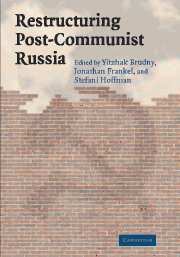Book contents
- Frontmatter
- Contents
- Contributors
- Preface
- Restructuring Post-Communist Russia
- INTRODUCTION
- THE COMPARATIVE DIMENSION
- RUSSIA IN FREE FALL? KEY CHALLENGES
- The Russian transition to the market: Success or failure?
- Potholes on the road to a flourishing Russia: Structural problems in the second decade
- The search for a national identity in the Russia of Yeltsin and Putin
- THE RUSSIAN POLITICAL SYSTEM: TOWARD STABILIZATION?
- Index
Potholes on the road to a flourishing Russia: Structural problems in the second decade
Published online by Cambridge University Press: 25 July 2009
- Frontmatter
- Contents
- Contributors
- Preface
- Restructuring Post-Communist Russia
- INTRODUCTION
- THE COMPARATIVE DIMENSION
- RUSSIA IN FREE FALL? KEY CHALLENGES
- The Russian transition to the market: Success or failure?
- Potholes on the road to a flourishing Russia: Structural problems in the second decade
- The search for a national identity in the Russia of Yeltsin and Putin
- THE RUSSIAN POLITICAL SYSTEM: TOWARD STABILIZATION?
- Index
Summary
To the casual visitor to Moscow's center, the claim that Russia has returned to the highroad of economic development would appear justified. The capital has returned to its finest, with new and impressive buildings, new monuments, clean and well-lighted streets – a city bustling with life. Beggars, the poor, and the homeless can still be seen, but in noticeably smaller numbers than in the nadir years of 1992 and 1993. Indeed, many of the indices of economic well-being showed improvement in 2002, and it would appear that the trauma of the August 1998 financial collapse has finally been overcome. President Putin informed his cabinet that gross domestic product (GDP) growth was 5 percent in 2001 and that the state's debt had been reduced by $10 billion without refinancing. Half a year earlier, Yegor Stroev, then speaker of the Federation Council, jubilantly announced to the St. Petersburg Economic Forum that President Putin's policies had put an end to Russia's new “Time of Troubles.” Yet, below the surface, the Russian polity and society face basic structural problems that put dark question marks on the country's horizon as it strives to make its second decade of independence one of growth. This chapter focuses on two of these problems, attempting to clarify the complexity of their roots and the broad ramifications of their consequences for Russia's future development.
The central problem to be considered is the demographic crisis that is facing Russia today.
- Type
- Chapter
- Information
- Restructuring Post-Communist Russia , pp. 136 - 159Publisher: Cambridge University PressPrint publication year: 2004



